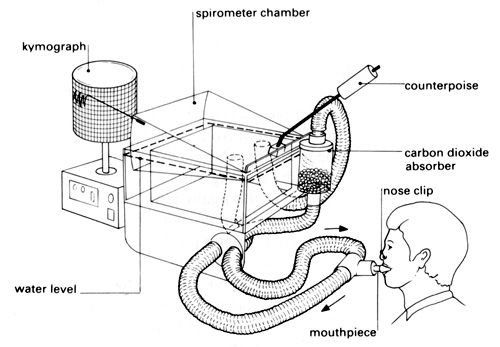Why can’t you hold your breath until you die?
Hold your breath for as long as you can.
How long did you last?
No more than a few minutes, I would guess.
If you try and hold your breath, eventually it becomes impossible. No amount of willpower can allow you to keep going. The feeling becomes unbearable and you simply have to breathe. The involuntary breathing centres in your brain override the voluntary control you are attempting to exert and it makes you gasp for breath.
Why can’t you make yourself hold your breath?
It is lack of oxygen isn’t it? As you hold your breath, cells continue to respire and use up oxygen and expel carbon dioxide. As you have stopped breathing, the amount of oxygen in the body (partial pressure of oxygen) starts to decrease. The cells of your body need oxygen to survive, so this lack of oxygen drives the body to override the voluntary control and make you breathe.
Wrong! A decrease in partial pressure of oxygen does not cause a continuation of breathing.
This is a very common medical misconception. Logically it makes perfect sense for oxygen to determine breathing rate, since a fall in oxygen is what will cause the body harm, yet this is not the case. It is actually a rise in the partial pressure of carbon dioxide the drives breathing rate.
While on the face of it this seems strikingly counterintuitive and potentially problematic for the body, in everyday life, this presents very little problems. This is because partial pressure of oxygen P(O2) and carbon dioxide P(CO2) are usually dependent on each other. While holding your breath cells continue to respire. This decreases P(O2), but increases P(CO2). Thus, an increase in carbon dioxide partial pressure is usually accompanied by a decrease in oxygen partial pressure.
A problem can only arise if P(O2) is decreasing, without an associated increase in P(CO2) to drive an increase in ventilation rate. While I can think of few situations where this may occur, it could potentially happen in a modern day environment.
NASA unfortunately decided to use nitrogen chambers when training astronauts for the (following a fire when using pure oxygen in the chambers prior to this). Despite circumventing the risk of fire, it did not overcome this peculiar aspect of human physiology. As the oxygen within the room was consumed by the training astronauts, the P(CO2) did not markedly increase in order to drive the urge to breathe. Five astronauts entered the chamber and passed out, and two died as a result. All because there was no stimulus telling their body to breathe (as we now know lack of oxygen is not enough).
How do we know an increase in carbon dioxide drives the urge to breathe?
Experimental evidence. Much like the situation described above gives scientists clues into the detection mechanisms, experiments can be designed to work out whether falling P(O2) or rising P(CO2) drives breathing. This can easily be achieved using a spirometer.
By setting up the spirometer with pure oxygen and a removable CO2 absorber we can test our theory. If the experimenter attaches the CO2 absorber then the subject will continue breathing until they pass out, and eventually die (if the mouthpiece is not removed in time). There is no increase in P(CO2) to be detected and cause a continuation of breathing. However, by removing the CO2 absorber the CO2 will accumulate in the tank causing the P(CO2) to rise and drive the urge to breath. A similar experiment to the one described here was undertaken by Schneider in 1930.
How is increasing P(CO2) detected?
By central chemoreceptors within the brain (chemoreceptor simply means a receptor that detects chemicals). As the P(CO2) within the blood rises, this causes more CO2 to diffuse across the blood-brain barrier. The enzyme carbonic anhydrase then converts CO2 and H2O into HCO3- and H+. Ultimately this results in a decrease in the pH of the cerebrospinal fluid, which is detected by the central chemoreceptors and leads to a drive to breathe.
While this discovery is bad news for NASA’s astronauts training in nitrogen chambers, it may come as good news to parents. Children threatening to hold their breath until they get what they want can be left to do so. It will be impossible for them to hold their breath until they die, and now we know why.
References:
Experimental evidence
Central chemoreceptors
Spirometry
Respiratory physiology


Ok... Great info.
you seem to have forgotten about diogenes
Apologies, I am not familiar with this. I am guessing it is highly relevant to this topic though!
he is an old philosopher from the time of plato. Nobody knows how he died, but one story goes that he just got bored of living and held his breath until he died.
Very interesting. Annoying I hadn't heard of him before, as this would have been something different and interesting to add to the post!
you should read up on him, he's honestly my favourite historical figure
I definitely will do. Thanks.
This post recieved an upvote from minnowpond. If you would like to recieve upvotes from minnowpond on all your posts, simply FOLLOW @minnowpond
Three astronauts died because of a lack of an impulse to breath? How did that manifest itself? Just marked lightheadness followed by death?
Sorry for the mistake, but two astronauts died as a result (I have now corrected this) and three others passed out. The chambers they used contained a the same amount of oxygen as air and nitrogen, but no carbon dioxide. Since the brain can only detect changes in carbon dioxide and not a lack of oxygen there was no stimulus that would force their bodies to breathe. Instead they remained in the chamber feeling as though they were breathing normally, yet unaware of the continually decreasing oxygen levels. Like you say, I think there would be lightheadedness until the astronauts lost consciousness. Remaining in the chamber then caused them to die, as oxygen partial pressures were extremely low.
That is absolutely bonkers. What a strange and quirk of human biology.
This post recieved an upvote from minnowpond. If you would like to recieve upvotes from minnowpond on all your posts, simply FOLLOW @minnowpond
Interesting to know! Thanks for the post @ovij Following you now! :)
Glad you enjoyed it.
@ovij nice upvoted,..just pm me..thanks
you have my support @ovij..^_^
kindly see my friend mrblu post..
i want to help him also..
kindly see his post please see mrblu post-please click here
P.s
dontryme2
@ovij thanks for visiting my post..i appreciate it..this is the symbol on our friendship..
i follow you post now..thanks and for the support also..i give you my upvote..
^_^ @mrblu
Interesting read. Thanks for sharing.